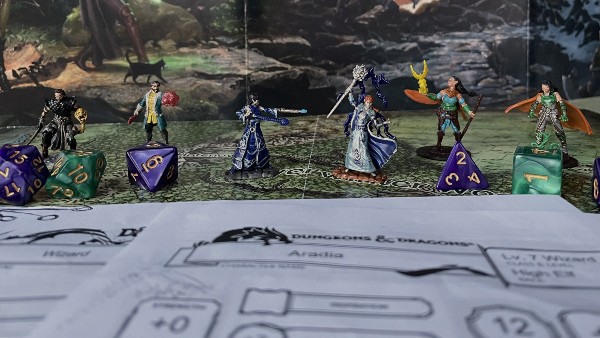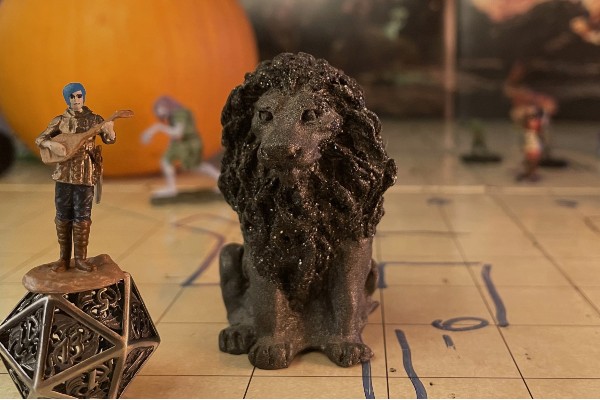The best Bard feats in DnD 5e are those that complement their playstyle and base class features well. Bards are naturally a great support class, with their Bardic Inspiration to provide bonuses to allies’ d20 checks, their Song of Rest to make short rests more restorative, and their ability to counter frighten and charm effects with Countercharm.
Bards are also experts outside of combat, able to become proficient and gain expertise in a variety of skills, as well as be decent at all skills by adding half their proficiency bonus to skills they’re not proficient in with Jack of All Trades. They’re normally the party’s “Face” since they’re incentivized to put points into Charisma anyway and can easily become proficient in skills like Persuasion, Deception, and Performance.
Then there’s the divide between your typical Bards, who usually favor spellcasting from the back line, and melee Bards of the Valor or Swords subclass, who tend to put themselves in more precarious situations.
Regardless of subclass, Bards should max out their main ability score (Charisma for most, Dexterity for Valor or Swords) before picking up their first feat. Otherwise, their spells and/or attacks won’t be as effective, and the feats won’t make up for that discrepancy.
With all these factors in mind, I’ve broken down the 9 best Bard feats into three categories, depending on your playstyle.
DnD 5e Best Bard Feats (Support/Utility)
1) Inspiring Leader
Spend 10 minutes to give up to six allies temporary hit points equal to your level + your Charisma modifier, once per rest (short or long).
This is a fantastic boost to your party’s survivability, and a great choice for a Bard who’s already planning on maxing out their Charisma.
For example, if you use this on a party of five at level 8, that’s 65 total temporary hit points; basically equivalent to a whole extra party member’s worth. And if you use it twice a day (very possible, if used at the end of a long rest and then the end of the day’s first short rest), it’s even more impactful.
Bards are already a great support class, and Inspiring Leader makes this even support capability more potent.
2) Fey Touched
+1 Charisma, learn the 2nd-level Misty Step spell (teleport up to 30 feet as a bonus action), and one 1st-level Divination or Enchantment spell, both castable once per day without expending a spell slot (or more using spell slots).
A half-ASI makes this a tempting first feat to get if your Charisma is currently sitting at 19. And two more spells known are a big boon to Bards, who are limited in how many spells they can know.
Especially since Misty Step is a great spell for avoiding danger (getting out of grapples, avoiding opportunity attacks, etc.) and getting into a better position.
As for a 1st-level spell, Bless (+1d4 to attack rolls and saving throws for 3 allies) is a great support spell for an already great support class. There’s a lot to love here, especially getting more free spell casts a day and more excellent known spells.
3) Eldritch Adept
Learn one Eldritch Invocation. Being able to pick up Armor of Shadows (Mage Armor spell at will, without a spell slot), Mask of Many Faces (Disguise Self spell at will, without a spell slot), or Misty Visions (Silent Image spell at will, without a spell slot) can add a lot to your character’s kit.
Mage Armor will boost your AC by +1 over light armor, Disguise Self makes you an even better candidate as the party’s Face when deception is in order, and Silent Image can be used for all sorts of trickery and shenanigans.
If you’re going to get the Magic Initiate (Warlock) to grab Eldritch Blast, then Agonizing Blast (+Charisma bonus to your EB damage) or Repelling Blast (push 10 feet for every EB beam to hit) can also be a great way to go.
4) Gift of the Metallic Dragon
Learn Cure Wounds, which you can cast once per day without expending a spell slot, and can use a reaction to grant AC equal to your proficiency bonus to you or an ally, usable (proficiency bonus) times per day.
Again, +1 spell known is nice, even if Cure Wounds is really only good as an out-of-combat heal.
But the real reason this feat is attractive is the faux-Shield spell-like effect. If you grab this at level 8, it’s worth +3 AC, scaling to +4 at level 9 and +5 at level 13. It’s a bit worse than the Shield spell, but without having to burn spell slots.
Plus, you can help out allies, albeit infrequently, as it’s usually a bad idea for a backline Bard to stand right next to other backline party members. But if you’re a Valor or Swords Bard fighting in the thick of it, this can save one of your tanky friends.
DnD 5e Best Bard Feats (Defense)
5) Moderately Armored
+1 Dexterity and proficiency with medium armor and shields. Assuming a 13 Dexterity score when you get this, this feat works out to a +6 permanent AC increase — a huge boost to your survivability. If you’re at 14 or 15 Dexterity, it’s a +5 permanent AC bonus — still phenomenal.
Note that this feat is redundant if you’re a Swords or Valor Bard, or plan on multiclassing into a class that gets you medium armor/shield proficiency. Otherwise, Moderately Armored is a very attractive feat to pick up.
6) Resilient (Constitution)
+1 Constitution and proficiency in Constitution saving throws. Many of a Bard’s most powerful spells rely on concentration (Faerie Fire, Hold Person, Hypnotic Pattern, etc.), and getting to add your proficiency bonus to concentration checks means they’ll have a better chance of sticking around for longer.
Plus, there are a host of other monster abilities and spells that rely on Constitution saving throws and are detrimental if they land — Resilient (Con) is also good for protection against these.
This is best picked up if you’re sitting at an odd-numbered Constitution score, since boosting your modifier will also net you +1 hit point per level.
7) War Caster
Advantage on concentration checks, can perform somatic components of spells while your hands are full, and can cast single-target spells in place of opportunity attacks.
Parts two and three of War Caster are largely worthless on most Bards (except Valor and Swords), but advantage on concentration checks works out to a +4 to +5 bonus. Depending on what level you’re picking up this feat and how deep your campaign is going, War Caster is more effective than Resilient (Con) for protecting your concentration.
However, for most Bards, I still prefer Resilient (Con) for its additional ability to protect you against ALL Constitution saves and possibly boost your hit points.
DnD 5e Best Bard Feats (Face)
8) Skill Expert
+1 ability score (Charisma if you’re not maxed yet, Constitution or Dexterity if you are), +1 skill proficiency, and +1 skill expertise (double proficiency bonus).
Bards already get two skill expertises at level 3, and another two at level 10; extending that to five total makes you incredible at a wide range of skills.
The extra skill proficiency is also nice, bringing you in line with Rogues for the most skill proficiencies in the game.
And the floating +1 ASI is nice for bringing up whatever odd-numbered ability score you have to increase its modifier (and your hit points, if it’s Constitution).
9) Actor
+1 Charisma, advantage on Deception and Performance checks, and the ability to mimic the sound/voice of any creature you’ve heard for at least 1 minute, which can only be seen through an Insight check vs. your Deception check.
An absolutely fabulous feat for any Face. If you have expertise in Deception or Performance already, adding advantage on top of that means you’ll basically never fail at these checks. The +1 Charisma is good if you’re sitting at an odd-numbered Charisma score, and the extra ability to mimic creatures can help you pull off even more deceptive shenanigans (almost assuredly with success, seeing as you have advantage on those checks).
Good Bard Feats Runners-up
These feats are neat and can be fun on a Bard, but I don’t think they’re “optimal.” That said, they’re worth considering if they suit your character’s backstory, role in the party, or you just think they’re nifty and would be cool in your campaign.
-
Magic Initiate. Learn two cantrips and a 1st-level spell from any full spellcaster’s spell list, castable without expending a spell slot once per day. Picking up Shield, Fire Bolt, and a utility cantrip from the Sorcerer spell list is attractive. Or, picking up Eldritch Blast from the Warlock spell list (along with an Eldritch Invocation from the Eldritch Adept feat to boost it) can also totally change how your Bard plays.
-
Shadow Touched. +1 Charisma, learn the Invisibility spell and a 1st-level Illusion or Necromancy spell, both castable once per day without expending a spell slot, or more if you do. Like Fey Touched, getting more known spells and having more effective spell slots (along with a half-ASI) are the attractive elements of this feat. I prefer Misty Step and Bless, but Invisibility and Disguise Self or Silent Image can also be neat, depending on your playstyle and role in the party.
-
Chef. +1 Constitution or Wisdom, can grant an extra 1d8 hit points during a short rest to any allies who spend Hit Dice, and can make (proficiency bonus) treats that grant temporary hit points equal to your proficiency bonus to anyone who spends a bonus action eating them. On top of Bard’s Song of Rest, this results in A LOT of short rest healing, and the temporary hit points are nice too. I prefer Inspiring Leader personally, but the +1 Con or Wis can make this a nice choice.
-
Metamagic Adept. +2 metamagic options and 2 sorcery points to spend on them. Twinned Spell to make single-target spells multi-target, Quickened Spell for a bonus action leveled spell + cantrip, or Subtle Spell for un-Counterspellable spellcasting or charm spells in public are all fun options for a Bard.
-
Telepathic. +1 Charisma, can speak telepathically within 60 feet, and learn Detect Thoughts, castable once a day without expending a spell slot. Good for the party’s face, and for silent communication in sensitive social situations (although the telepathy is one-way only).
-
Skilled. +3 skill or tool proficiencies. Make your Bard even more of a skill monkey, and pick up proficiency in thieves’ tools if your party lacks it currently.
-
Ritual Caster. +2 1st-level ritual spells from a full spellcasting class and the ability to learn other ritual spells from that class (if you find them in a spellbook or spell scroll). Adding more to a Bard’s limited spells known is always good, even if you are limited to ritual spells. But hey, grabbing Find Familiar as a 1st-level spell adds a lot of fun utility to a class that already has that in spades.
-
Alert. +5 initiative, can’t be surprised, and unseen attackers don’t get attack advantage against you. Going earlier in combat is always a good thing, especially when you can provide Bardic Inspiration to allies going later in the initiative. The other perks are nifty, but not nearly as good as the +5 bonus, especially for overcoming your weak Dexterity modifier (unless you’re a Valor or Swords Bard).
-
Telekinetic. +1 Charisma, Mage Hand cantrip (invisible and double the range as normal), and a bonus action shove attempt against creatures within 30 feet. I normally love this feat, but it’s less attractive for Bards because they need their bonus action to hand out Bardic Inspiration.
-
Gift of the Chromatic Dragon. +1d4 elemental damage to a weapon for 1 minute as a bonus action, usable once per day, and the ability to use a reaction to get resistance (half damage) against acid, cold, fire, lightning, or poison damage (proficiency bonus) times per day. The bonus damage is worthless unless you’re a Valor or Swords Bard, but the Reactive Resistance is a big deal for any Bard. You don’t normally get Absorb Elements as a Bard, so this is the only way to reduce incoming damage from big-impact effects like dragon breath.
-
Defensive Duelist. Valor or Swords
-
Lucky. Can reroll 3d20 per day, including attack rolls against you. Technically good on any character in DnD 5e, but boring as heck.



![Best Feats For Ranger 5e [DnD] ranger-walking-through-forest](https://www.dndlounge.com/wp-content/uploads/2023/12/ranger-walking-through-forest-300x169.webp)
![Best Feats For Fighter 5e [DnD] dwarven-fighter](https://www.dndlounge.com/wp-content/uploads/2023/11/dwarven-fighter-300x169.webp)
![Best Feats For Paladin 5e [DnD] balor-dungeons-and-dragons-5e-vs-paladins](https://www.dndlounge.com/wp-content/uploads/2022/03/balor-dungeons-and-dragons-5e-vs-paladins-300x219.jpg)
![Best Feats For Barbarian 5e [DnD] orc-barbarian-raging](https://www.dndlounge.com/wp-content/uploads/2023/12/orc-barbarian-raging-300x169.webp)